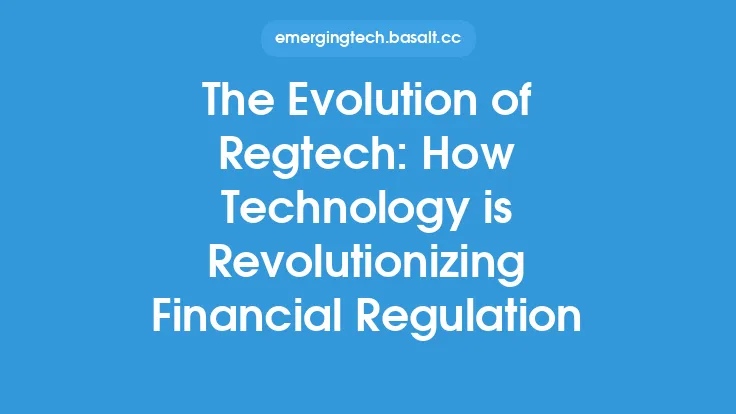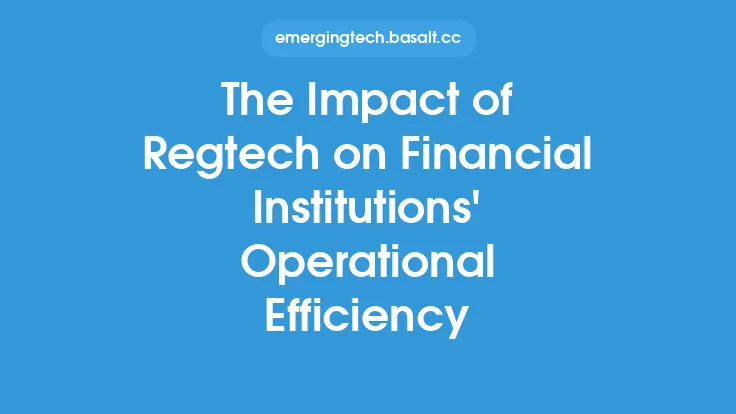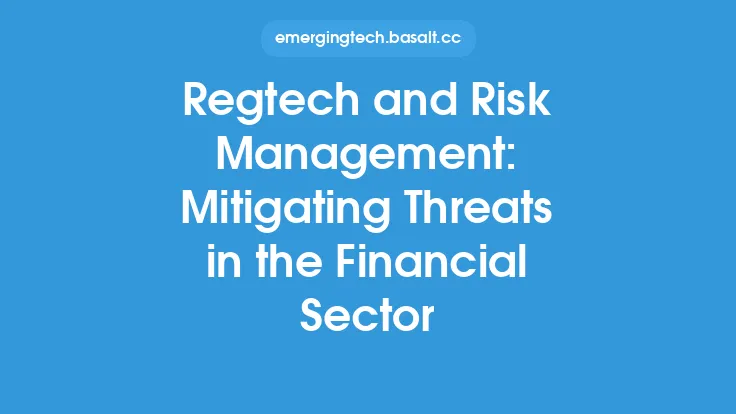The financial regulatory landscape has undergone significant transformations in recent years, driven in large part by the advent of regulatory technology, or regtech. This emerging field has brought together the expertise of technologists, regulators, and financial institutions to create innovative solutions that enhance the efficiency, effectiveness, and transparency of regulatory compliance. At its core, regtech is about leveraging technology to streamline and automate the processes involved in meeting regulatory requirements, thereby reducing the burden on financial institutions and improving the overall quality of compliance.
Introduction to Regtech
Regtech is a subset of the broader fintech industry, focusing specifically on the application of technology to regulatory challenges. It encompasses a wide range of solutions, from data analytics and machine learning to cloud computing and blockchain, all aimed at making regulatory compliance more manageable and less costly. By automating manual processes, regtech solutions can help financial institutions reduce the risk of non-compliance, improve their regulatory reporting, and enhance their overall risk management capabilities.
Key Components of Regtech
Several key components underpin the regtech ecosystem, including data management, analytics, and reporting. Data management is critical, as regtech solutions rely on high-quality, accurate data to function effectively. This involves not only the collection and storage of data but also its validation, normalization, and integration into existing systems. Analytics play a crucial role in regtech, enabling institutions to identify trends, detect anomalies, and predict potential compliance risks. Reporting is another essential component, as regtech solutions must be able to generate reports that meet the specific requirements of regulatory bodies, often in a timely and automated manner.
Technologies Driving Regtech
A variety of technologies are driving the regtech revolution, including artificial intelligence (AI), blockchain, and cloud computing. AI and machine learning are being used to develop more sophisticated compliance systems that can learn from data and adapt to new regulatory requirements. Blockchain technology offers a secure, transparent, and immutable way to record transactions and store data, which can be particularly useful for regulatory reporting and compliance. Cloud computing provides the scalability, flexibility, and cost-effectiveness needed to support the complex data analytics and processing requirements of regtech solutions.
Benefits of Regtech
The benefits of regtech are multifaceted, offering advantages to both financial institutions and regulatory bodies. For institutions, regtech can significantly reduce the costs associated with compliance, improve the efficiency of regulatory processes, and minimize the risk of non-compliance. Regtech solutions can also enhance transparency and accountability, providing real-time insights into compliance status and risk exposure. For regulators, regtech offers the potential for more effective oversight, improved data quality, and enhanced risk monitoring capabilities, ultimately contributing to a more stable and secure financial system.
Challenges and Future Directions
Despite its promise, regtech faces several challenges, including the need for greater standardization, interoperability, and regulatory clarity. The regtech industry must work closely with regulatory bodies to ensure that solutions are aligned with evolving regulatory requirements and do not inadvertently create new risks or compliance challenges. Looking ahead, the future of regtech is likely to be shaped by advancements in AI, the increasing adoption of cloud and blockchain technologies, and the growing importance of data analytics and cybersecurity. As the financial regulatory landscape continues to evolve, regtech is poised to play an increasingly critical role in shaping the future of compliance and risk management in the financial sector.
Implementation and Adoption
The implementation and adoption of regtech solutions require careful planning, collaboration, and change management. Financial institutions must assess their current compliance processes, identify areas where regtech can add value, and develop a strategic roadmap for implementation. This involves not only selecting the right regtech solutions but also ensuring that they are properly integrated into existing systems and processes. Training and education are also essential, as staff must be equipped to understand and effectively use regtech tools. Regulatory bodies, too, have a role to play, providing guidance and support to facilitate the adoption of regtech and ensuring that regulatory frameworks are conducive to innovation and technological advancement.
Global Regulatory Environment
The global regulatory environment is becoming increasingly complex, with financial institutions facing a myriad of requirements from different jurisdictions. Regtech can help navigate this complexity by providing solutions that are adaptable to different regulatory regimes and can handle the nuances of local compliance requirements. International cooperation and standardization will be key to the future success of regtech, enabling the development of solutions that can be applied globally and facilitating the sharing of best practices and regulatory intelligence across borders.
Conclusion
Regtech is transforming the financial regulatory landscape by providing innovative, technology-driven solutions to compliance challenges. As the industry continues to evolve, it is likely to have a profound impact on the way financial institutions manage regulatory risk and comply with regulatory requirements. By understanding the key components, technologies, and benefits of regtech, as well as the challenges it faces and the future directions it may take, stakeholders can better navigate the changing regulatory environment and harness the potential of regtech to create a more efficient, effective, and transparent compliance framework.





